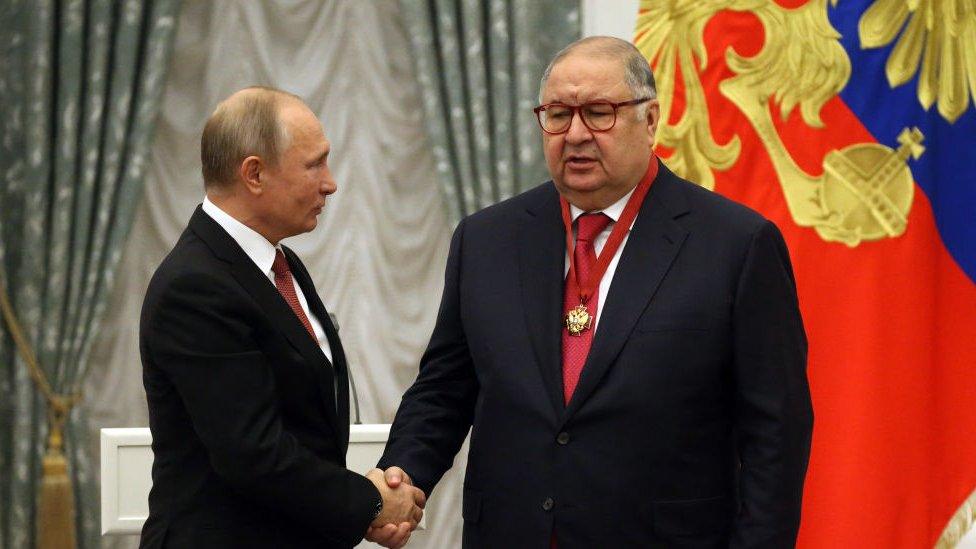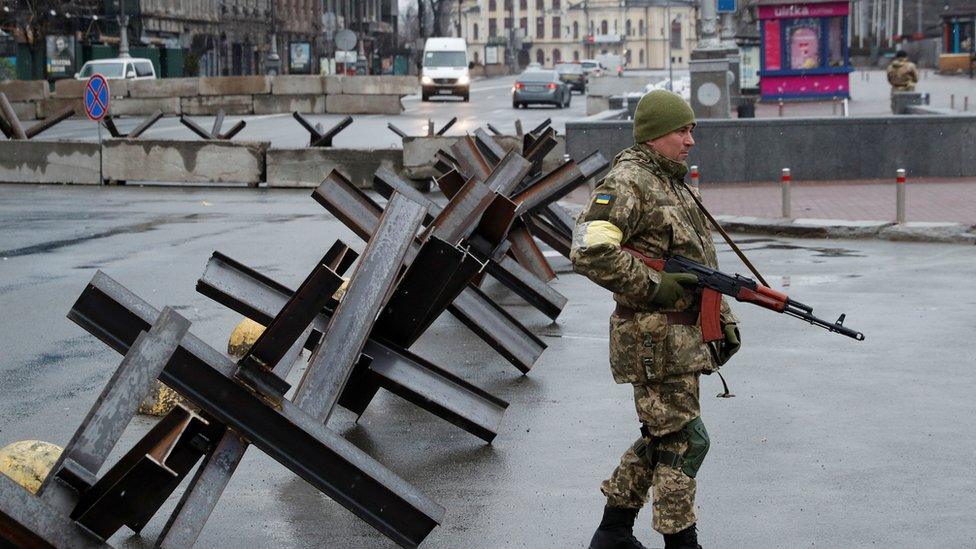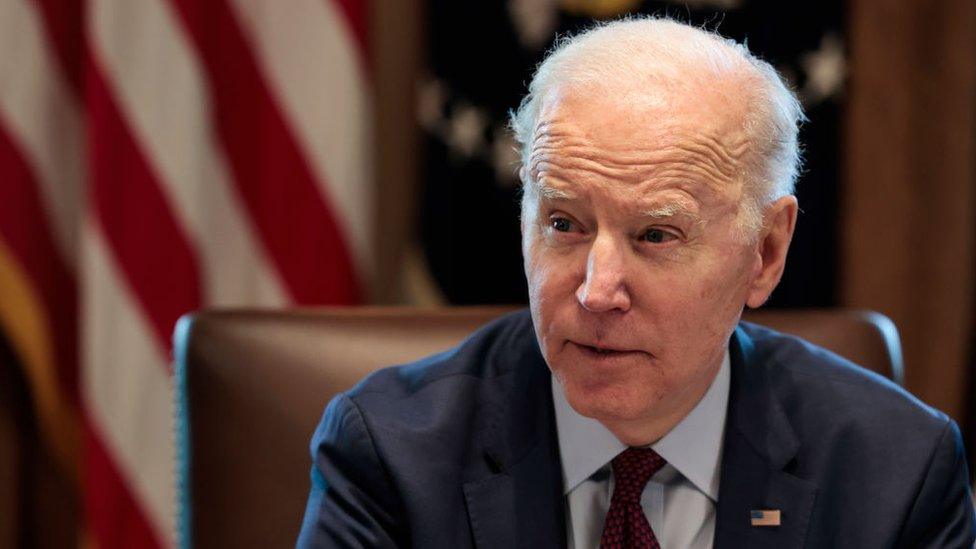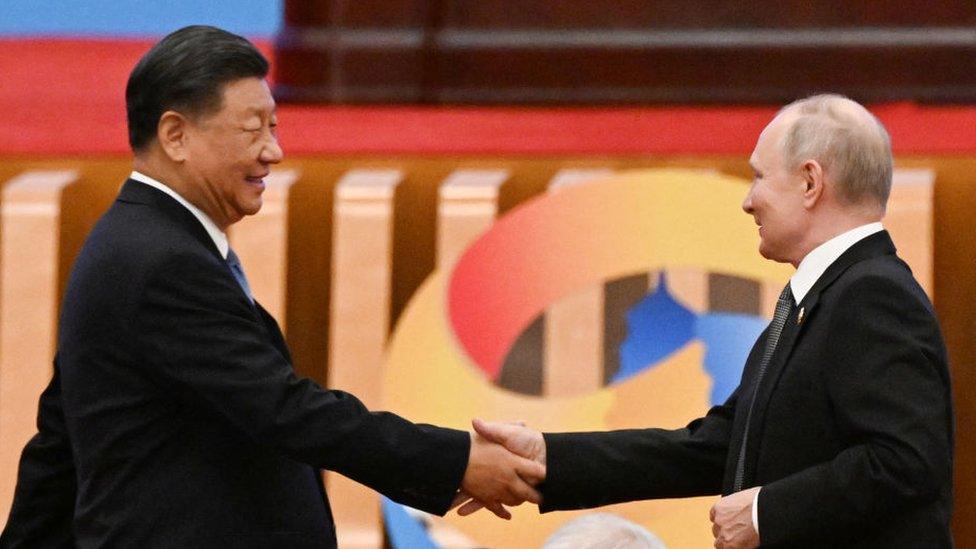Gas prices hit new record sparking fears over bill rises
- Published
- comments

A jump in the price of gas amid the Ukraine conflict has added to worries that annual UK household energy bills could reach £3,000.
The cost of gas in Europe and the UK has hit record levels as fears persist that Russian supplies could be reduced.
Higher costs for aluminium and copper also means UK shoppers are likely to face further price rises, the head of the London Metal Exchange has said.
Economists have warned inflation, which tracks the cost of living, may hit 10%.
Wholesale markets are where UK energy suppliers buy their gas to sell on to consumers. On Friday, wholesale gas prices for delivery to UK supplier jumped to 508p per therm. If prices remain high for long periods it will push up household bills, adding to cost of living pressures.
Over the past few days, gas prices have been extremely volatile, but the trend has been upwards.
On Thursday, an industry body warned that UK household energy bills could reach as high as £3,000 a year.
In addition, the recent surge in the cost of metals is also likely to push up the prices of some goods. Copper prices are at five-year highs, and other commodities have jumped in price since the Ukraine conflict began.
Matthew Chamberlain, who leads the London Metal Exchange, told the BBC's Today programme that prices for canned goods and copper wiring may rise.
"We've seen aluminium and nickel up 30% since the beginning of the year, and that will ultimately be passed on to consumers when you buy your drinks can made of aluminium, or when you make renovations to your house and you need copper for your wiring, all of those prices do go into the overall inflationary pressure."
Panmure Gordon economist Simon French told the BBC that the UK's inflation rate could now hit 10%.
Sarah Hewin, a senior economist at Standard Chartered Bank, agreed, warning that with rising gas prices feeding into higher energy bills, and increasing petrol and food prices, it was "entirely feasible" that inflation could move beyond the 7.5% rate that the Bank of England has predicted for April.
"Russia and Ukraine are important grain producers so we're likely to food prices rising here in the UK as well," she said.
"Overall, food, energy and transport account for around 25% of consumer prices. It's possible, if the crisis continues in the coming weeks, and even months, that inflation could move up to double digits in the UK".
UK petrol prices have hit another record, with the average price of a litre of petrol reaching £1.53 a litre, while diesel reached £1.57 a litre.
This week, the price of Brent crude - the global oil benchmark - surged to more than $119 a barrel at one point, the highest since May 2012. On Friday, it was trading at around $114 a barrel.
Share slide
Stock markets across Europe tumbled on Friday following sharp falls in Asia after a fire broke out at the Zaporizhzhia nuclear power plant in Ukraine, the largest in Europe.
London's FTSE 100 closed 3.5% down while France's CAC-40 index dropped 5% and Germany's Dax also fell 4.4%.
Reflecting the sharp rise in commodity prices, Anglo-Russian gold producer Polymetal saw its share price in London jump by more than 25%. Evraz, the Russian steel-maker which counts oligarch Roman Abramovich as a major shareholder, also saw its share price jump by 23%.
The fire at the Ukraine nuclear power plant happened after Russia troops shelled the site. Some investor concerns were eased after officials said the plant's safety was "secured".
The International Atomic Energy Agency (IAEA) later said that it had spoken to Ukraine's leadership and had been told important equipment at the plant was still working.
The shelling has drawn international condemnation, with the US President Joe Biden joining Ukrainian President Volodymyr Zelensky in urging Russia to cease the shelling and allow firefighters to access the site.
In recent days, Russia's invasion of Ukraine has sent shockwaves through the global financial and energy markets, as investors try to understand the implications of sanctions and supply chain disruptions.
The price of gold, which is regarded as a safer asset in times of uncertainty, has increased by 7.3% in a month to $1,938 per ounce.
The Russian rouble has hit a record low against the US dollar as countries around the world impose tough sanctions on the country.
Meanwhile, more British executives are bowing to pressure to quit Russian companies.
James Rutherford on Thursday became the latest UK national to step down from a Russian company's board, resigning from the Roman Abramovich-backed steel firm Evraz.
It came after the business group the Institute of Directors called on Britons to resign from the boards of Russian companies, due to the invasion of Ukraine.

Russia attacks Ukraine: More coverage
THE BASICS: Why is Putin invading Ukraine?
RUSSIA: Watching the war on TV
IN DEPTH: Full coverage of the conflict

Related topics
- Published3 March 2022

- Published4 March 2022

- Published3 March 2022

- Published17 May 2024
